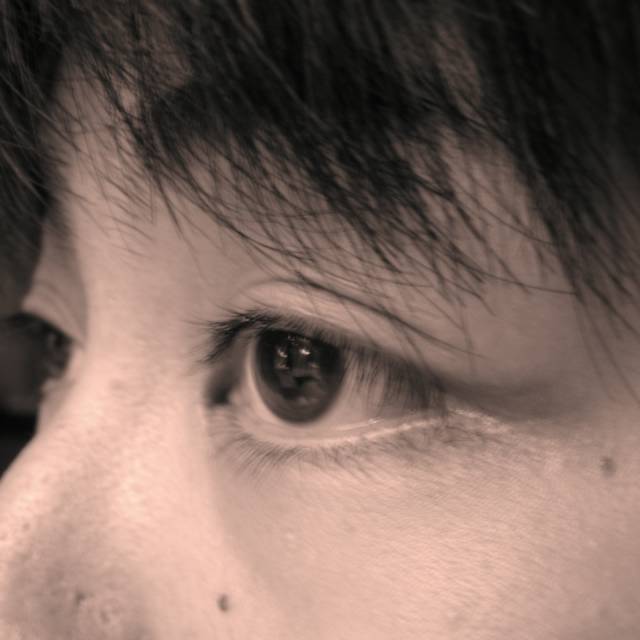"Ten Nights' Dreams" Soseki Natsume-9
[This is my translation of the ninth story in "Ten Nights' Dreams" by Soseki Natsume from Japanese. For a brief information about the book and the author, refer to my biased and unprofessional comment. Your feedback is always appreciated.]
The world has started to feel vaguely turbulent. A war seems to break out at any moment. It feels as if bareback horses, burnt out from the stable, were rampaging around the premises day and night, and the foot soldiers were chasing them in troops day and night. Yet inside the house it is still and quiet.
There are a young mother and a three-year-old child. The father has gone somewhere. He went away to somewhere in a moonless midnight. He put on a pair of straw sandals on the floor, put on a black coif, and went out from the kitchen door. The paper lantern the mother held at that time cast a narrow, long light into the black darkness, revealing an old cypress tree inside of the hedge.
The father has never returned. The mother asks the child every day, "where is your father?" The child didn't say anything. After a while, it has learned to say "over there." Even when the mother asks "when is your father coming back?", it replies "over there" and smiles. At such moments the mother smiles. She has repeatedly been teaching it the phrase "he is coming back soon" countless times. But the child has learned only "soon". Sometimes it says "soon" when it is asked "where is your father?"
When night falls and everything settles down, the mother retighten her sash, tuck a dagger in a shark-skin sheath into the sash, straps the child onto the back with another, narrower sash, and sneaks out from the wicket gate. The mother always has a pair of straw sandals on. The child sometimes falls asleep on her back, listening to the sound of these sandals.
Down along the residential area lined with earthen walls to the west, there is a giant gingko tree at the end of a long downward slope. Turning right at the gingko tree, a stone gate of a shrine appears about a hundred yards ahead. On one side of the path to the gate are rice paddies, while on the other side are bamboo bushes as far as the eyes can sweep. Past the gate, the path cuts into a dark cedar grove. Then about a forty yard of a stone-paved approach leads to the foot of a front shrine. Above an offertory chest, washed out to a dull gray, hangs a rope of a large bell, next to which is a calligrapher and framed name of the shrine only visible in the daylight. One of the characters has an intriguing design of two doves facing each other. There is a variety of other frames as well. Most are metal archery marks with the names of their men who hit the center of it. A few encases swords.
Past the stone gate, there is always hooting of an owl on the crest of a cedar tree. And the sandals make wet sounds. When the sound cease in front of the front shrine, the mother first chimes the bell, then kneels immediately and claps her hands in worship. Usually the owl abruptly stops hooting at this moment. Then the mother frantically prays for the safety of her husband. According to her single-minded faith, with her husband being a samurai warrior, there is no reasonable way that her devoted vow to this god of bow and arrows should not be heard.
The child often wakes up to the sound of the bell, looks around to find himself in a total darkness, and bursts into crying on her back. Then the mother, uttering some muffled prayer in her mouth, rocks her back in an attempt to comfort him. Sometimes the cry stops. Other times it gives out even more intense squalls. Either way, the mother would not stand up easily.
When she is done with the prayer for her husband's safety, she unties the narrow sash, sliding the child down and around from the back to the bottom, climbs up to the front shrine with the child enfolded in her arms, and determinedly rubs her cheek to the child's, saying "you're a good child, you can wait for me for a little while, can't you?" Then she lets the sash long and loose, ties the child to the railing of the front shrine by one of its ends. And she comes down the steps to walk back and forth the hundred yards of the stone-paved approach in prayer.
The child, tied to the front shrine, crawls around the wide veranda in darkness, as long as the length of the narrow sash allows him to. Such is a quite easy night for the mother. When the secured child screeches, however, she becomes nervous. Her steps of the prayer of hundred laps pick up. She gasps for breath. When it is absolutely inevitable, she goes up to the front shrine halfway through the prayer of hundred laps, lulls the child with a whole bag of tricks, and restarts the laps again.
The father, whom the mother worried over for innumerable nights, without being able to sleep even in the wee hours, has long been killed by a master-less samurai.
My mother told me this sad story in a dream.



0 Comments:
Post a Comment
<< Home